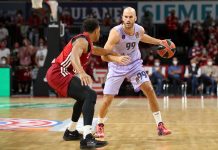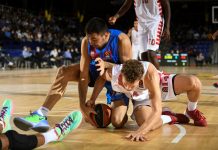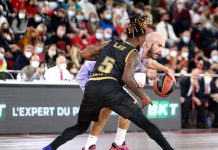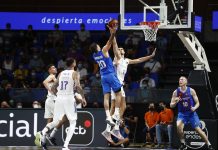After a four-year stint in Russia and Turkey with Unics Kazan and Bahcesehir, Quino Colom returned to his native Spain last summer for the sake of Valencia Basket.
Since 2015, the career of the Andorran point guard has been on a constant rise, combining both personal and team achievements. Despite the fact that he has never celebrated a national or international success on the club level, Colom’s introductory card includes one of the most prestigious titles: the World Cup, won by Spain in China. One could argue that this was the culmination of a career, which includes bronze medals at the 2006 U18 European Championships and the 2008 U20 European Championships with Spain, as well as an All-EuroCup First Team selection for the 2017-18 season with Unics.
Colom turned into a national hero at the World Cup Qualifiers when Spain was deprived of EuroLeague players. The experienced guard turned up, making decisive plays and taking crucial shots (like the game-winning lay up vs Latvia) to pave the Spanish team’s way to the final phase of the competition.
Now he finds himself in a new team trying to keep its head above the water. The same goes also for him. Since the start of the season, Colom’s playing time and contribution to Valencia’s efforts are not remotely resembling his glorious time at Kazan (11.3 points, 5.7 assists and 3.9 rebounds for Unics over 25 games in the 2016-17 season) or Istanbul (15.6 points, 6 assists and 3.1 rebounds in 27 Turkish League games last season). For a player who had to find recognition out of his country and secure a spot on his NT’s roster only after legendary players like Navarro and Calderon had stepped out, the way to success has never been easy.
Quino Colom knows it very well and shares his views on his career so far with TalkBasket.net. The occasion was Valencia Basket’s game -which ended up in defeat- against Panathinaikos OPAP in Athens. The Spanish side lost that battle, but the 31-year-old floor general is aware that the road to success is far longer than a 40-minute encounter.
Q: How did your experience your duel with Calathes?
A: In the first half, we managed to contain him, but in the second he found a rhythm that allowed him to take advantage of the screens set for him and dished out many assists. In addition, he found the space to try a few floaters. He’s a player that’s very difficult to stop and who passes the ball very well.
Q: Did you know that you two have a statistical figure in common? Calathes is the last player to have registered a triple-double in the EuroLeague, while you had done the same in EuroCup competition about four years ago (15 points, 13 assists and 11 rebounds against Buducnost on December 9, 2015).
A: Yes, Calathes was again on the verge of another triple-double. He was only one assist short. The most common problem among us guards is that despite our ability to pass, which can result in many assists, we can’t rebound the ball very well. Calathes, on the other hand, is one of the point guards that get a lot of rebounds. That’s something he can do on any given day. He’s a great player and undoubtedly one of the best point guards in Europe.
Q: Your participation in the FIBA World Cup prevented you from joining the pre-season of Valencia Basket. Are you trying to regain the lost ground?
A: Apart from being out of shape, the main problem was to get into the team’s rhythm. Valencia decided to get me accustomed little by little and that’s why until now I haven’t played more than 20 minutes in one game. In the end, I accept the team’s rotation. We are three guards and it takes time to adapt to the new plays and styles. I haven’t been used to those kind of rotations over the last five years, as I was getting much playing time on my former teams. Therefore, it’s obvious that I can’t do the things I did with my other teams.
Q: A few days ago, Jose Manuel Calderon announced his retirement from basketball. To what extent did he influence your playing style?
A: He was one of the best guards in the history of Spanish basketball, for sure. However, he and I had very different styles. Hence, I’d say that there were other players that had an impact on me, but I always have tried to adopt some details from good players and Jose Calderon was one of the best. In terms of athleticism, he was a lot superior to me, he took advantage of his feet and I couldn’t stop watching him setting screens, shooting and passing the ball.
Q: If not Calderon, who was the player that you used to look up to?
A: Perhaps Jasikevicius and Steve Nash were the players whose career I followed the most. Neither of them was very athletic, but they both managed to conceal that deficiency and played at a very high level. Besides, there were also some very good Spanish players, such as Raul Lopez, Sergio Rodriguez and Ricky Rubio. All those players had quality and I definitely had my eyes set on them.
Q: In your opinion, is there room in modern basketball for guards who don’t possess athletic qualities?
A: In our time, more than ever, basketball is a game for athletic and intelligent players. So, keeping a balance in the roster is essential for every team. This means that in EuroLeague, there are many athletic point and shooting guards who can even dunk the ball.
Q: Is Valencia Basket lacking athleticism?
A: I think that we’re lacking a little bit of everything. We have to believe in ourselves as a team and incorporate all the players that we have, so that everyone has their role. In this way, we could create a positive dynamic and go from there.
Q: Do you see Valencia Basket as a Spanish League contender?
A: Barca and Real Madrid are very strong teams, two of the best in Europe, for sure. This year, they have strengthened even more their rosters. We have to go on with our project and see what happens in the end. I think that we’re capable of competing with them, as we saw in the game that we lost to Barca. There’s just one small step to be made in order to get to that level.
Q: In the Spanish League, one of the main issues seems to be the scarse participation of native players. Per Alfonso Reyes, head of the Association of Professional Basketball Players, the success at the World Cup conceals the lack of Spanish players in the Liga ACB. What’s your view?
A: We’re the league with the lowest percentage in native players globally. 27% is a very poor percentage and we’re all trying to raise it. We saw that all Spanish youth teams, Under-16, Under-18 etc. ended up winning gold medals, something that shows that the level of basketball in Spain is high. There are coaches who work well, players who emerge all the time, but we’re not able to put them on the court. It doesn’t make much sense. As far as I am concerned, I had to play abroad for four years in order to find a place in the National Team and the Spanish League. As Spanish players, we’re trying to protect ourselves, but for the time being it seems that the clubs prefer to sign other nationalities.
Q: Can you tell me what happened last summer before you signed with Valencia Basket? Did other Spanish clubs reach out to you?
A: These questions would be better answered by my agent, but in general I understood that there were both Spanish and non-Spanish clubs after me. In the end, I decided to return to Spain. Valencia presented me with a combination of the things I was looking for: a team that always competes well at any level and strives to place itself high in the standings, having won the EuroCup and also a spot in the EuroLeague; a good organisation, a nice city and also my family at close proximity.
Q: Were you ever tired of playing and being abroad?
A: No, I was very satisfied. Maybe in Turkey the situation was a bit more difficult, but Russia was definitely enchanting, despite the fact that I didn’t have high expectations. I had a good time over there. In Turkey I didn’t like the lifestyle; there are too many people in Istanbul and everything seems chaotic. Returning to Spain was not my priority. Thanks to technology, you can be close to your beloved ones. When you travel often and especially if you play in two-three competitions, you don’t think about your country too much.
Q: While in Athens, did you have the time for a reunion with your old pal, Keith Langford?
A: No, I didn’t manage to see him in Athens. He was with Marcus Slaughter, who was working out at OAKA, but Langford had left when I came to the stadium. He’s a guy with whom I had a very good relationship. We had good chemistry on the court and achieved important things in Unics Kazan. Although we didn’t get to meet, I use to talk with him and follow what he’s doing. He’s a hell of a player.
Q: Was he the best teammate that you had in your career?
A: I’ve had some very good ones, especially in the National Team. As a pure scorer, Langford was the best I’ve played with. I enjoyed our two years in Kazan very much and therefore I’d say that he was one of my best teammates.
Q: Last year, he told me that he considers you one of the most underrated guards in Europe.
A: I appreciate that. The truth is that there was a time when I had that feeling too. In the end, everyone paves their own path. There are things in life that seem more or less fair, people that may appreciate you more or less than others, but it’s all about being positive. I believe that I’ve made a nice career; I have won the World Cup, I’ve signed good contracts, while I enjoyed playing professional basketball in three countries.
Q: Two years ago, were you disappointed for not making the cut for the 2017 EuroBasket?
A: I wanted to be on the final roster, but those things happen. I believe that I had three very good seasons (2014-2017). I cannot think of a player who came close to the numbers I had at that time and was not included in his NT’s roster. It was hard, but I had to focus on the things I could control. If I were on the NT back then, it would have been like a prize to me.
Q: Are you going to keep playing for the Spanish National Team?
A: I hope so, as long as they keep selecting me. Hopefully, we will have a future as bright as this year.















